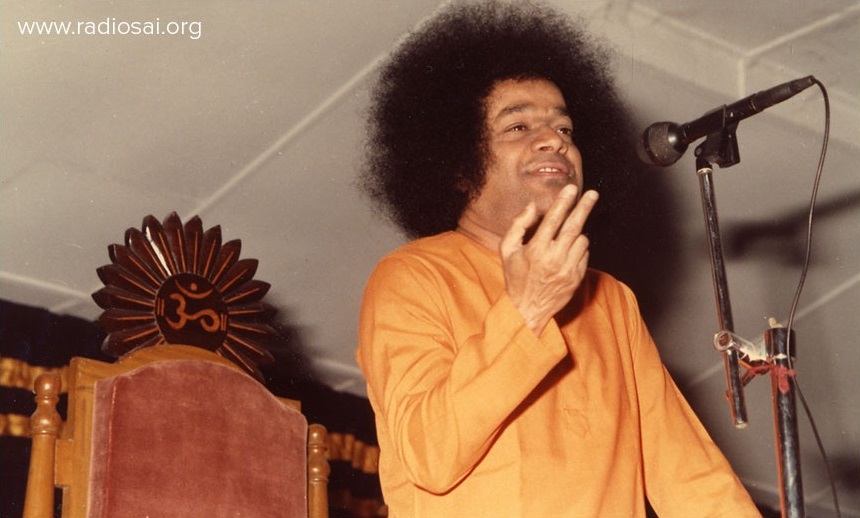
Sri Sathya Sai Speaks
Divine Discourses spanning 7 Decades (1950 – 2011)
Sri Sathya Sai Speaks, Vol 7 (1967) (Download)
24 November 1967 | Prasanthi Nilayam |
Pilgrims! Do not tarry!
WHEN Arjuna plaintively approached Krishna for courage and consolation, the Lord advised him, “manmanabhava” – “Fill your mind with Me. Let all urges be for Me, let all acts be dedicated to Me.” The mind has no strength of its own; it has to lean on some person or thing all the time. It is like the stray cow that trespasses into field and eats off growing crops. If you feed it well in your own farm its trespassing habit will vanish. Your pet dog will wander in the bazar for scrapings from dustbins, if you do not feed it full at home. Give the dog a nice full meal; it will lie under the porch and guard your house! The mind too can be weaned away from vicious desires if you feed it on good thoughts, good resolutions, tenderness and love. Then only will it serve your best interests.
Ramakrishna Paramahamasa told an addict that he must not consume more than a given quantity of opium; he gave him a piece of chalk, to weigh every day the quantity of opium he can eat – no more, no less! But, he imposed a condition, whose usefulness in helping him to conquer the bad habit the addict did not realise then. It was that every time he used the weight he had to write on a slate, the Pranava (Om), before putting it on the scale of the balance. The fellow obeyed; the chalk was reduced in weight with every Om, until it was eliminated in full; the opium habit too was reduced out of existence! The Om also helped to transfer his attachment from the opium-induced tranquillity to the everlasting Bliss of God-intoxication.
Sensitive sympathy of a saint for his disciples
Man is on a long pilgrimage towards God. He moves from one life to another to the goal of Splendour. On the way he has to take shelter in many caravanserais, or rest-house, but, however attractive these may be, he cannot strike root but has to remind himself of the journey’s end! Once when Samartha Ramadas was moving about the countryside with his disciples, those behind him saw a fine field of juicy sugar cane and entered it and started pulling out the cane and crunching it with great relish. The owner of the field was naturally enraged at their behaviour and at the loss to which they were subjecting him; he fell upon them with a stout cane. The Master was sorry that they broke discipline so badly, drawn by the desire of the tongue for the sweet juice. Next day they reached Emperor Shivaji’s Palace, where a great welcome awaited the Guru and his followers. Shivaji offered to attend personally to the Guru during his ceremonial bath; when Ramadas undressed, Shivaji was shocked to find broad red marks, indicating that he had been beaten! Such was the sensitive sympathy of the great saint that he received on his back the blows meant for his pupils; Shivaji sent for the owner of the field of cane; and, when he stood shivering in fear before the Emperor and his Guru, Ramadas was requested by Shivaji to inflict on him any punishment he liked. But, Ramadas accepted that wrong was committed by his disciples, that they should not have allowed the cane to attract them into theft. He blessed the farmer and granted him a boon that his lands will be tax-free for ever! The sandalwood tree will lend its fragrance even to the axe which cuts it down. That is the nature of the good and the great. Follow their example: do not merely bang the table in your lectures, asserting the glory of the sons and daughters of India. If you are hypocritically banging the table, the table will laugh at you and bang back at you – action and reaction being equal and opposite.
Do the karma which will make more karma unnecessary
Ants build their city grain by grain, selecting the finest mud for the purpose, the result being in impregnable rockfort, where they can live in security. You should also gather, grain by grain, act by act, the wherewithal to build a secure future for yourselves, a mansion of Dharma. You must swallow the drug that will render drugs unnecessary; you should do the Karma, which will make further Karma unnecessary. But, the drug that is eaten now intensifies the drug habit; one Karma leads to a thousand, in order to cover up the consequences. The Incarnation has come to point the way out of this vicious circle.’ Hand over to Me your hundred thousand paltry Karmas and worries – each one, a paisa. If they are genuine and sincere, I shall take them all and give you a thousand-rupee currency note (Grace) which is lighter and easier to keep. Of course even if one pain or grief or worry or fear is counterfeit, the Note will not be given. The Upanishadhs were not composed or collected by persons who craved fame or fortune; nor are they the vapourings of idlers and scribblers. They have the true ring of actual experience. They arose out of compassion for others wandering in the wilderness, out of concentration on the means of liberation from the dual chain of tears and triumph. Those upon whom the people are traditionally depending for guidance have become callous, forgetting their task, or involved in darkness and dialectics. So, there is need to spread the message of Love, which is the message of God. Simplicity is the sign of Divinity. Pomp, paraphernalia, jaw-breaking formulae, abracadabra, dark mysterious mumblings – these are alien to the spirit of true religion. These are tricks by which man wants to monopolise or gain God.
Control of senses increases efficiency
A bottle gourd when green will sink in water; but, a dry one will float. The mind is the gourd. Dry it in the sun of knowledge, let the weight of attachment, the green of ‘greed’ disappear; you can float happily over the waves of care. Journeying through life without knowing the control of the senses is like venturing to ride a brakeless car. Disaster is certain. Control increases efficiency; removal of embankments, bonds, brakes, limits – this robs life of sweetness and sense of adventure. How can you play football without rules, ‘hands,’ ‘offside,’ ‘foul play’ and similar limits on freedom to hit and kick The five elements – ether, air, fire, water and earth – are the vesture of God, as well as of Man. Use them, moderately and with wisdom, with fear and humility. Their characteristics, for which they are sought after, are sabdha (sound) of the sky, representing akasha (ether); sparsha (touch) of vayu (wind); ruupa (form) of Agni (Fire), rasa (flavour, taste) of Ap (water); and gandha (smell) of prithvi (earth). Even these, sound and others, have to be moderate if they have to confer comfort. Care kills quicker and surer than disease. Man misuses his intelligence and memory to grieve over the past and plan far into the future. Thereby he loses his heritage of peace and joy.
Creation, preservation and merging are the three forms of the Divine Will. By Karma yoga, you grasp the meaning of creation and the created; by Bhakthi yoga, you understand the preserver and the preserved; by Jnana yoga, you merge into the principle from which you have emerged.
– Sri Sathya Sai Baba
